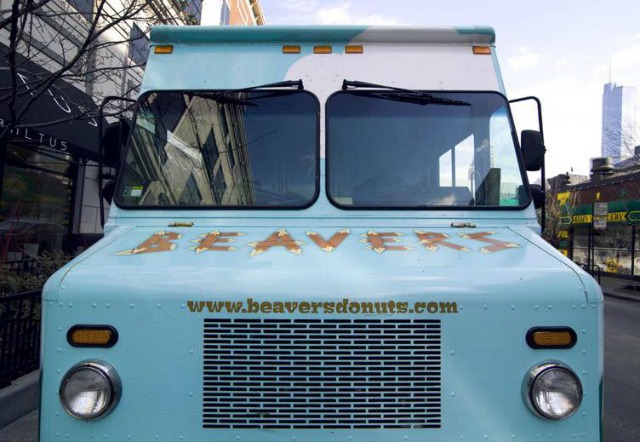Don't Crack Down On 'Unjust' Rules, Food Trucks Urge
By Stephen Gossett in Food on Sep 1, 2016 5:10PM

Beavers Donuts / Facebook
Joint reports published last week by the Sun-Times and ABC7 take a critical, investigative look at traffic violations committed by food trucks and “lax” city enforcement thereof. Food-proprietors quickly offered up a defense. They reiterated that two of the city’s key food-truck rules are “unjust”; and the city’s brand of enforcement is a rather sensible workaround to such unfair restrictions. But Mayor Rahm Emanuel, it now appears, favors the side of stricter enforcement.
Rules prohibit food trucks from parking within 200 ft. of brick-and-mortar competition and parking longer than two hours in a single location. The time limit “makes it virtually impossible to prepare fresh food and have enough time to serve enough customers and be profitable,” according to a statement released by the Illinois Food Truck Owners Association.
The reports uncovered instances in which multiple food trucks set up on the same block, which is a violation. But Gabriel Wiesen, owner of Beavers Donuts food truck and interim head of the IFTOA, said this is necessary for business, a point that is also given voice in the Sun-Times piece from other food-truck owners. “There’s a reason we all go to two or three areas each day,” he told Chicagoist. “Most of the designated areas don’t have enough foot traffic to support business.”
But Wiesen disagrees with the conclusion that enforcement routinely turns a blind eye. (ABC7 reports an average of 12 tickets issued per year, with three issued so far in 2016. CDOT has issued no citations, according to the Sun-Times.) Wiesen says that officials from BACP and CDOT, along with police, take a common-sense approach to irrational rules, by issuing warnings and asking trucks to move. “They don’t want to put 60-plus families out of work,” he said. “They’re doing the best they can while still abiding by the ordinance.”
According to Wiesen, the underlying problem is a small but vocal lobby that looks to ticket trucks and petition City Council to keep parking restrictions tight. Most restaurateurs support food trucks, he said, but “the rules are in place to protect the restaurant industry at large.”
“But the fear is unfounded. We can coexist and thrive alongside one another,” he said.
Still, some have called for increased enforcement, including Ald. Brendan Reilly, whose 42nd ward includes a food-truck hotspot located in the 100 block of S. Clark St., the Sun-Times reports. (Ald. Reilly did not return multiple requests for comment.)
But those in the food truck industry who favor reform over enforcement now face vocal opposition from the very top. Mayor Rahm Emanuel on Monday said the problem lies on "the enforcement side."
“The food truck industry has been a good addition to the city of Chicago," he said, as quoted in the Sun-Times. "It has not been the threat the restaurant industry originally talked about. That said, the department must enforce the rules. Otherwise, there’s a breakdown in the system. And they have no other choice."
The previous choice of selective enforcement was a better one, food truck advocates argued. But that—along with any rule amendments—now appears to be an even steeper uphill drive.